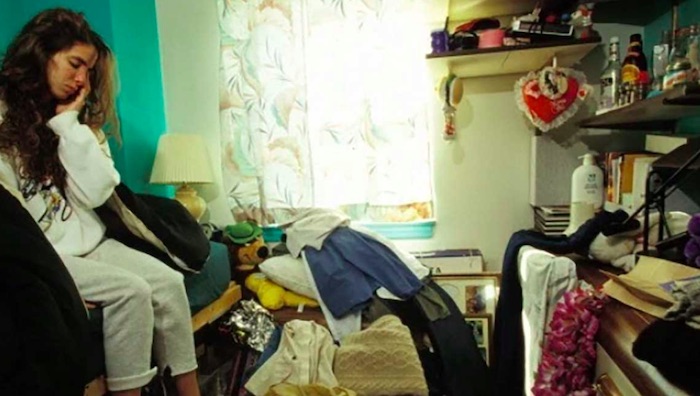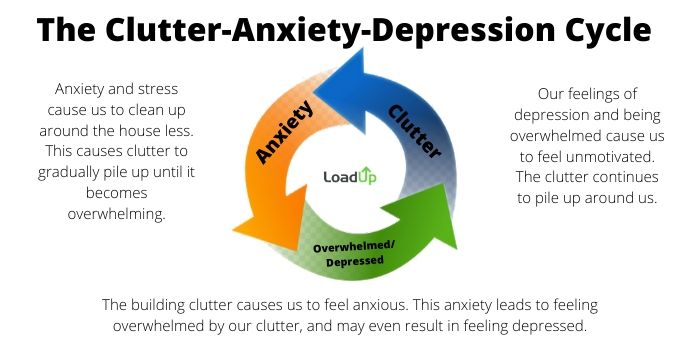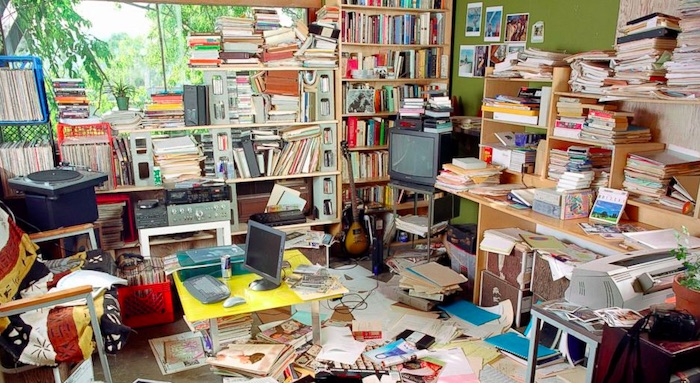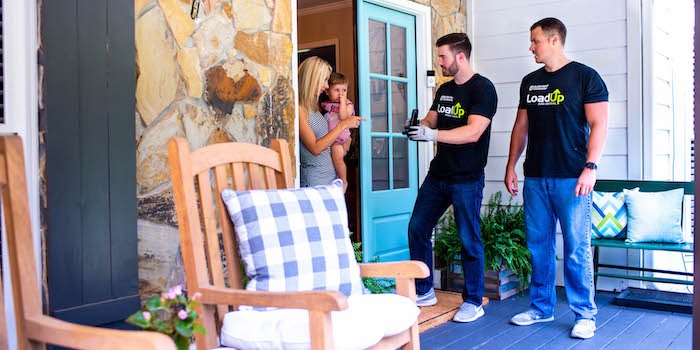
Are you overwhelmed by too much stuff? Clutter and anxiety go hand-in-hand. Clutter is a sign of stress and anxiety just as much as clutter is a trigger of stress and anxiety. In some cases, clutter causes stress.
Unfortunately, they tend to lead to a anxiety cycle, where one thing perpetuates the other. The only way to break the vicious cycle is to make some changes to your surroundings and daily habits.
It may sound daunting, but when it’s broken down into small steps, it’s actually quite manageable to break free from that clutter-anxiety cycle.
In this article, we take a close look at the relationship between clutter and anxiety and provide some concrete steps to help you pull yourself free from the downward spiral.
Table of Contents
**Click to auto-scroll by section
Clutter Causes Anxiety
The clutter-anxiety cycle is real. Both of these complex feelings feed off of each other, which causes us to fall deeper and deeper into the clutter-anxiety-depression trap when you have too much stuff.
According to an article in Psychology Today, having too much clutter plays a significant part in contributing to anxiety and stress, but it’s rarely recognized for its true significance. The fact that this topic has gone so unrecognized and addressed is definitely not helping us break the clutter-anxiety cycle!
The Relationship Between Clutter, Anxiety and Depression
To best understand the relationship clutter has with anxiety and the psychological reasons for clutter, it’s important to put it into everyday perspective.
Let’s break it down, piece by piece:
- Anxiety and stress play a large part in feeling overwhelmed. And you can easily be overwhelmed by clutter.
- Those feelings of stress and anxiety over clutter can also lead to depression, which causes us to become less vigilant when it comes to cleaning up.
- The clutter builds up around us, leading to a cluttered house that causes us to feel even more overwhelmed, anxious and depressed.
- In turn, that leads to less motivation to clean up, which results in the piles of clutter getting larger and more widespread across our homes.
It’s hard to pinpoint which leads to which initially, but it usually starts small. Clutter builds up around us so gradually that at times, we don’t even realize how bad it’s become until it’s really bad.
Why Does Clutter Cause Anxiety?
- Clutter clouds the mind, making it difficult to relax both physically and mentally.
- Clutter makes us feel embarrassed, and often guilty for our mess.
- Large piles of clutter are difficult to tackle and the thought of not knowing where to start makes us anxious.
- Clutter causes us to misplace everyday items like our keys, wallets, and phones, which can be a significant source of stress.
- Clutter stifles our creativity by taking up space in our minds that are usually open for brainstorming and creativity.
- Clutter triggers our brains to feel like nothing is ever done because the environment around us is never clean.
- Clutter causes our minds to go into overdrive from unnecessary stimuli, causing a sense of unrest.
- Clutter distracts our focus to the overwhelming mess around us and takes our focus off of things that are truly deserving of our attention.
- Clutter can actually make you sick by increasing levels of the stress hormone cortisol. Cortisol contributes to tension and can lead to self-medicating or other unhealthy habits.
The Clutter-Anxiety-Depression Cycle
Depression is a tricky topic. Not everyone suffers from clinical depression, and not everyone feels depressed as part of their daily life. But all of us are able to, at one point or another, feel depressed or down about something. That depression can also manifest as feeling anxious or overwhelmed.
That’s not to say that depression and feeling overwhelmed are the same – because they’re not. But for the purpose of understanding the cycle, it makes sense to lump them together. Also, because clutter causes anxiety and depression, which usually results in overwhelming feelings of helplessness or hopelessness.

Depression can come from within or from external sources. For the purpose of the clutter-anxiety-depression cycle, we’ll be dealing with depression (or feeling overwhelmed) as being caused by external factors. You got it! Clutter and anxiety.
Clutter Control: Getting Rid of Clutter Anxiety
Your home should be a safe place. As Marie Kondo says, it should “spark joy”, not make you want to crawl out of your own skin. A cluttered house = a cluttered mind. With all the stressors in the world around us from work, kids and everyday life in general, it’s important for our homes to be a place where we can unwind, relax and feel at peace.
So when your home is cluttered with things you probably haven’t seen, thought about or used since 1990, it tends to lead to more anxiety than peace.
When the clutter gets overwhelming, it’s a good idea to jump-start the cleaning process by getting some help with the decluttering process from a reliable, trustworthy junk removal company. Especially when you have too much stuff, but not enough space.
A junk removal company can help you downsize quickly, kind of like ripping off a bandaid instead of pulling it off little by little.
A trusted junk removal service can be incredibly helpful when getting rid of your clutter. As a nationwide, full-service junk removal company, LoadUp provides junk removal services and eco-friendly disposal in all 50 states. We are incredibly experienced in removing everything from boxes and bags of household junk to unwanted furniture items and appliances.
Sometimes, starting with a fresh, blank slate is the only way to get out from under that overwhelming pile of stuff and avoid the messy house anxiety.
Breaking the Clutter-Anxiety-Depression Cycle
Luckily, anxiety caused by clutter can be fixed. It’s not always easy, but there are actionable, concrete steps you can take to break the cycle for good.
If clutter is the source of your anxiety and depression, cleaning up the mess around your home will alleviate the feelings of anxiety and depression that your clutter is causing you.
There’s a well-known saying that goes, “A place for everything and everything in its place.” When dealing with clutter, a lot of the problem is that the items piling up around you don’t have a place where they can be kept. So in this case, keeping that old verbiage in mind is key to succeeding through the process of breaking the cycle.
Built-up clutter could mean you don’t have enough storage furniture items to hold things, so they end up sitting on top of dressers, tables and even piled up in corners. But by simply purchasing some organizational items, or even hiring a professional organizer, you’ll be able to live by the motto in no time.

How to Conquer Anxiety Over Clutter at Home
It’s important to know that when it comes to dealing with clutter-driven anxiety, you’re not alone. The uneasy feelings caused by clutter don’t play favorites or discriminate.
Aside from those who are hard-wired to be highly organized people, just about anyone can fall victim to the clutter-anxiety-depression cycle.
So let’s look at some concrete ways to break free from the vicious cycle, once and for all.
1. Tackle One Room at a Time
If your clutter has spread into multiple rooms, seeing the clean-up as one task is going to add to your stress, and could cause your efforts to be wasted. We want to avoid that. So instead of cleaning up a little here and there, focus on one room at a time.
Since everyone’s clutter situation is different, there’s no set timeline for how long you can expect this to take. And it doesn’t need a timeline.
Setting goals for each room is a good way to start, but telling yourself that you’ll have your entire home decluttered in six months could actually add to your anxiety over a messy house.
2. Keep Sentimental Items
We cannot stress this enough – if it’s sentimental, don’t get rid of it. Instead, make a permanent home for it. For small things, try keeping a small box.
Get creative with it! Instead of throwing everything into a shoebox, create a memory box that is deserving of all your small sentimental items. That way it won’t get confused with other items that are simply being stored.
For larger items, or if you have a lot of sentimental stuff, consider getting an old trunk or piece of luggage to keep everything. A cool, vintage trunk can live at the foot of your bed, keeping your sentimental items close while keeping them organized and out of sight.
3. Assess Your Furniture and Storage Situation
As we mentioned earlier, it’s important for everything you own to have a designated location. A lot of times clutter piles up on surfaces that should truly be minimally decorated – or even empty – because there’s just nowhere else to put it.
If that’s the case for you, you might need to add a few extra pieces of furniture to your home. Cabinets and drawers are great for keeping clutter away, while also keeping things organized.
It also might just be that you don’t have the right furniture. If that sounds like you, make sure that you don’t make the mistake of accidentally contributing to more clutter by adding furniture when you should be replacing older, less-functional furniture pieces.
4. Donate, Sell or Recycle Unwanted Items
Back to Marie Kondo’s philosophy – if it doesn’t spark joy, get rid of it. Granted, there are probably many items you have that you wouldn’t consider trash.
Items like furniture, clothing, household appliances, dishes and electronics that are in good working condition can be donated or sold.
Choose carefully when you decide what to sell and what to donate. On one hand, you don’t want to keep too much stuff around that won’t sell quickly, since that just defeats the purpose of decluttering. On the other hand, you might have valuable items that you would rather see a small return on instead of donating them. We get it, who doesn’t enjoy making a few bucks?
When you’re faced with this conundrum, here’s what to consider:
- Can the item be stored in a place that is safe, dry and out of sight, like a closet, garage, or spare room?
- Is there a market for this item?
- Is the value of the item worth holding onto it instead of donating it?
If you can say ‘yes’ to all of the questions above, then go ahead and list your item for sale on Facebook Marketplace, eBay or your favorite peer-to-peer selling site. If not, put it in the “donate” pile.
💸 Did you know…? Donations are tax-deductible and can be used for breaks on your taxes at the end of the year. Save your donation receipts and file with your taxes to get a little back for your donations.
As they say, “one (wo)man’s trash is another (wo)man’s treasure”. If you’ve ever enjoyed a rummage sale or gotten a charge when finding something amazing for next to nothing at the thrift store, then you fully understand this concept.
Donating items that are in good, working condition isn’t only a good way to get rid of your clutter, it’s also a way to help out your local economy. Your donations help keep people employed. Without donations to sort through, there would be a lot of people out of work. You can feel really good about donating your stuff when you keep all of this in mind.
5. Put Things Away After You’re Done Using Them
As simple and silly as it may seem, clutter actually builds pretty easily when you don’t put back an item after you’re done using it. Our parents and teachers instilled this concept in us as children to keep their homes and classrooms tidy, but for some reason, many of us fall back into bad habits in adulthood.
It takes repetition to form a habit. Try to be conscious of putting things away when you’re done with them, and it will become second nature sooner than you know it.
6. Make Decluttering Fun!
How could cleaning up clutter be fun, you ask? Easy. Put on your favorite upbeat tunes (a workout playlist works well for this), grab a glass of wine or beer, and get started!
Tackling Clutter at Work
You don’t want your messy home life to invade your workspace, but it’s pretty common that over time, it does. Since accumulating clutter has a lot to do with our mental health and habits, making sure the clutter doesn’t carry over to the office can be tough if we’re not actively changing our bad habits.
One great way to make sure piles of paperwork and random desk accessories don’t make your desk at work look like a small tornado came through the office is to make it a new habit to clean up your desk every day.
Here are a few things to keep in mind when cleaning up at the end of the day:
- Shred or recycle papers you no longer need.
- Make sure chargers, monitor cables, and power cords are neatly tucked away.
- Keep everything in its place in your desktop organizer or in your desk drawers.
- Push in your chair when you leave your desk. It makes a difference and helps actively instill these new habits with small, repetitive actions.

Hire a Junk Removal Company to Haul Away the Rest
When you use LoadUp’s eco-friendly junk removal services, our Loaders won’t simply haul your stuff to a landfill. Instead, we always try to either recycle or donate your unwanted junk, whenever possible, to keep as much stuff out of the landfill as we can.
LoadUp’s nationwide in-home and curbside junk removal services make it easy to get rid of your household clutter as soon as tomorrow.
With rates 20-30% less than most other junk removal companies around, LoadUp is your best choice for unmatched service at a competitive, affordable rate.
Instead of dealing with on-site estimates and a lengthy quote process that can take several weeks, LoadUp offers upfront, guaranteed pricing for junk removal jobs without ever having to come on-site beforehand.
For large piles of random junk, we offer a really cool option where you can text pictures of your junk pile(s) to (678) 884-4738, and we’ll get back to you within minutes with a quote when you send a picture during our normal business hours.
When you’re ready to kick the clutter and anxiety for good, make LoadUp your partner for eco-friendly, professional junk removal. Give us a call at (844) 239-7711 or visit us online to get started with your quote and schedule a pickup today!
Related Articles from the Trash Talk Blog:

